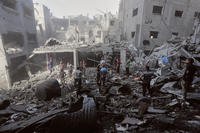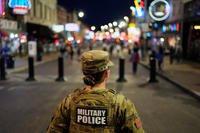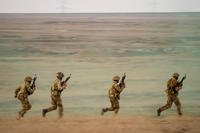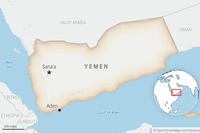The director of the CIA met with the Taliban's top political leader in Kabul amid the ongoing effort to evacuate people fleeing their takeover of Afghanistan, a U.S. official said Tuesday.
William Burns' visit Monday came ahead of a planned meeting among leaders from the Group of Seven nations about the crisis in Afghanistan and a warning from U.N. human rights chief of credible reports of “summary executions” and restrictions on women in areas under Taliban control. That's fueling fears of what their rule might hold a week before U.S. forces are set to withdraw.
Michelle Bachelet urged the Human Rights Council to take “bold and vigorous action” to monitor the rights situation in Afghanistan in the wake of the Taliban's stunning takeover, as she sought to ensure that international attention on the country doesn’t wane.
Taliban leaders have promised to restore security and tried to project an image of moderation, but many Afghans are skeptical and are racing to the leave the country, leading to chaos at Kabul's international airport. Amid scattered reports, it has been difficult to determine how widespread abuses might be and whether they reflect that Taliban leaders are saying one thing and doing another, or if fighters on the ground are taking matters into their own hands.
Burns traveled to Kabul on Monday to meet Abdul Ghani Baradar. The details of their discussions weren't immediately known.
The Washington Post first reported Burns’ meeting with Baradar. The U.S. official confirmed the report on condition of anonymity because they were not authorized to speak publicly.
G-7 leaders plan to meet later Tuesday to discuss the burgeoning refugee crisis and the collapse of the Afghan government amid wrangling over whether the full U.S. withdrawal of troops could be extended beyond the end of the month to allow more time to evacuate those desperate to leave.
U.S. administration officials have refused to be pinned down about whether an extension is likely or even possible given that a Taliban spokesman has warned that Aug. 31 is a “red line” and that extending the American presence would “provoke a reaction.”
In the meantime, tragic scenes at the airport have transfixed the world. Afghans poured onto the tarmac last week and some clung to a U.S. military transport plane as it took off, later plunging to their deaths. At least seven people died that day, and another seven died Sunday in a panicked stampede. An Afghan solider was killed Monday in a gunfight.
On Tuesday, Bachelet called for strong action to investigate reports of rights abuses.
“At this critical moment, the people of Afghanistan look to the Human Rights Council to defend and protect their rights,” she said. “I urge this council to take bold and vigorous action, commensurate with the gravity of this crisis, by establishing a dedicated mechanism to closely monitor the evolving human rights situation in Afghanistan.”
By “mechanism,” Bachelet was referring to the possibility that the council might appoint a commission of inquiry, special rapporteur or fact-finding mission on the situation in Afghanistan.
While advocacy groups like Human Rights Watch echoed such calls, a draft resolution at the council stopped far short of intensified scrutiny — and appeared to push back any deeper look at the rights situation until next year.
Bachelet cited reports of “summary executions” of civilians and former security forces who were no longer fighting, the recruitment of child soldiers, and restrictions on the rights of women to move around freely and of girls to go to school. She cited repression of peaceful protests and expressions of dissent.
Bachelet did not specify what time timeframe she was referring to or the source of her reports.
Days earlier, a Norway-based private intelligence group said it obtained evidence that the Taliban have rounded up Afghans on a blacklist of people they believe worked in key roles with the previous Afghan administration or with U.S.-led forces. Several Afghans are in hiding, saying they fear such reprisals.
When the Taliban last ruled Afghanistan in the late 1990s, the group largely confined women to their homes, banned television and music, chopped off the hands of suspected thieves and held public executions.
Bachelet noted that Taliban leaders have recently pledged to respect the rights of women, girls and ethnic minorities and refrain from reprisals.
“The onus is now fully on the Taliban to translate these commitments into reality,” she told the 47-member-state council, which is the U.N.’s top human rights body.













